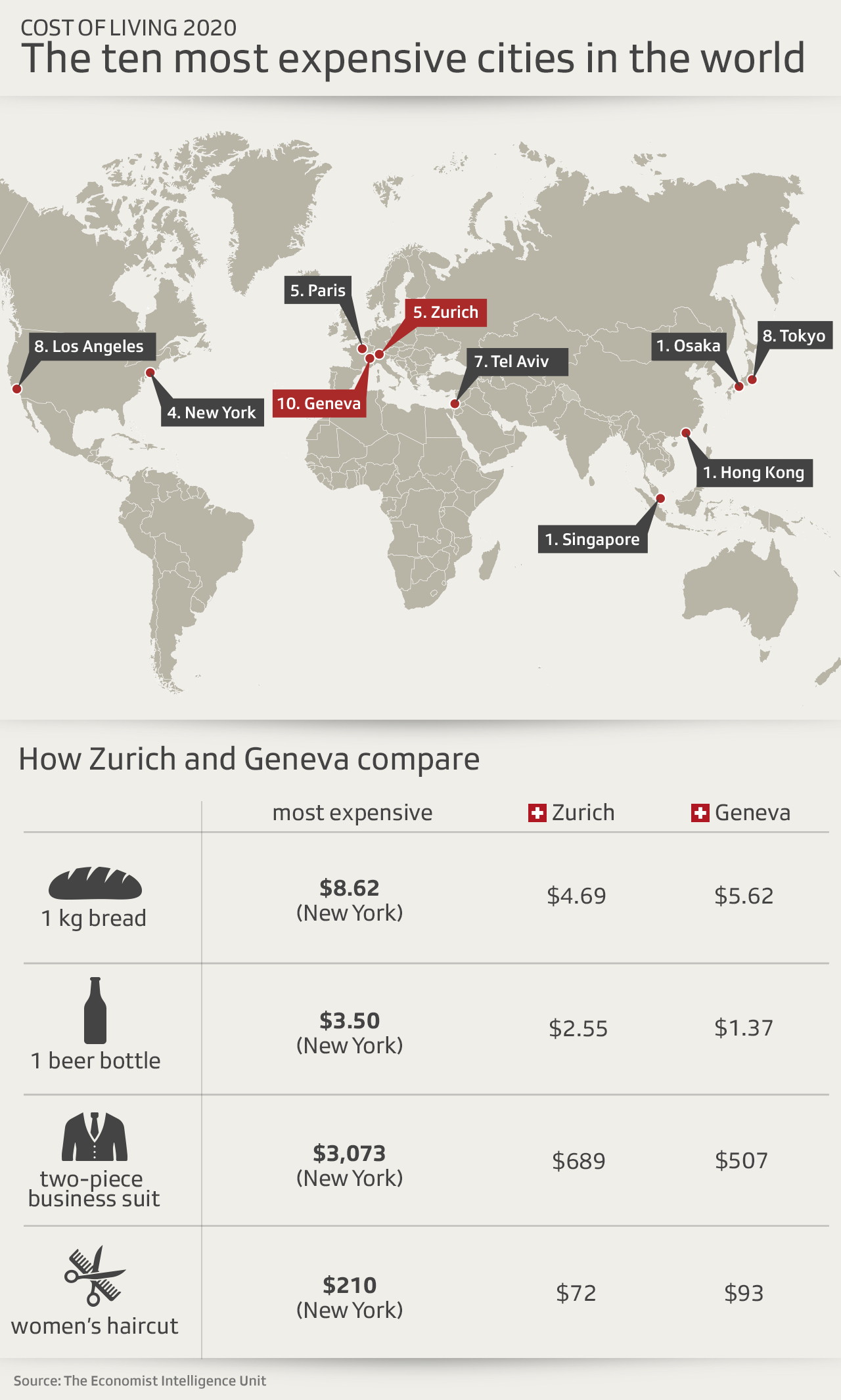
Ranking finds Swiss cities less expensive

Zurich and Geneva are still among the world’s ten most expensive cities, but both have slid down the rankings since last year. The full effect of the coronavirus crisis remains to be seen.
In the Economist Intelligence Unit’sExternal link annual report comparing the cost of living in cities around the world, Zurich is tied for 5th place with Paris; in 2019 it ranked 4th.
Geneva – in 5th last year – now ranks 10th. First place is a three-way tie between Singapore, Hong Kong and newcomer Osaka; New York has climbed three slots into 4th.

The survey includes prices for items like consumer goods, rent and transport in 133 cities around the world. [See box below for more details.] The cost of living has fallen by around 4% on average, states the Worldwide Cost of Living 2020 report. While 31 of the 37 European cities have become cheaper since the 2019 report, 15 of the 16 US cities have become more expensive.
“European cities are likely to fall even more in comparison to US cities,” said report author Nicholas Fitzroy, attributing this to the weak euro and a decrease in demand. Although Switzerland with its franc is not part of the eurozone, participating nations are important trading partners for the Swiss.
Based on research done in September and March, some prices had already been influenced by the Covid-19 crisis. The Economist Intelligence Unit (EIU) is keeping an eye on the effect of the various regional and national lockdown measures.
“The longer they go on in any country, the heavier the economic burden will be. That being said, for a [European] country like Switzerland, restrictions in other European countries will have a big impact, given the interdependence of their economies,” Fitzroy, Risk Briefing Director and Middle East analyst at the EIU, told swissinfo.ch.
Tourism on hold
“We are currently expecting the Swiss economy to contract by around 5% in 2020, owing to the hit to both domestic and global demand from local lockdowns and international travel restrictions,” Fitzroy said.
He pointed out that Swiss unemployment was rising more slowly than in Western nations like the US and Britain, which implies that the downward pressure on prices, due to collapsing demand, might be less significant in Switzerland.
“However, the importance of the Swiss tourism industry, which will be destroyed in the short term, will be an important factor in suppressing demand, in turn driving down prices,” he said.
Switzerland could suffer its worst economic downturn on record, the government said on Wednesday, with the coronavirus epidemic shrinking the economy by as much as 10.4% this year.
The Worldwide Cost of Living is a biannual Economist Intelligence Unit (EIU) survey of over 400 individual prices across 160 products and services in 133 cities in 93 countries. These include food, drink, clothing, household supplies and personal care items, rent, transport, utility bills, private schools, domestic help and recreational costs.
EIU researchers survey a range of stores: supermarkets, mid-priced stores and higher-priced specialty outlets. Prices are not recommended retail prices or manufacturers’ costs; they are what the paying customer is charged.
The survey allows for city-to-city comparisons, but for the purpose of this report all cities are compared with a base city of New York, which has an index set at 100. The survey has been carried out for more than 30 years.
(Source EIU)

More
Dating on the cheap remains a challenge in Zurich

In compliance with the JTI standards
More: SWI swissinfo.ch certified by the Journalism Trust Initiative






























You can find an overview of ongoing debates with our journalists here . Please join us!
If you want to start a conversation about a topic raised in this article or want to report factual errors, email us at english@swissinfo.ch.